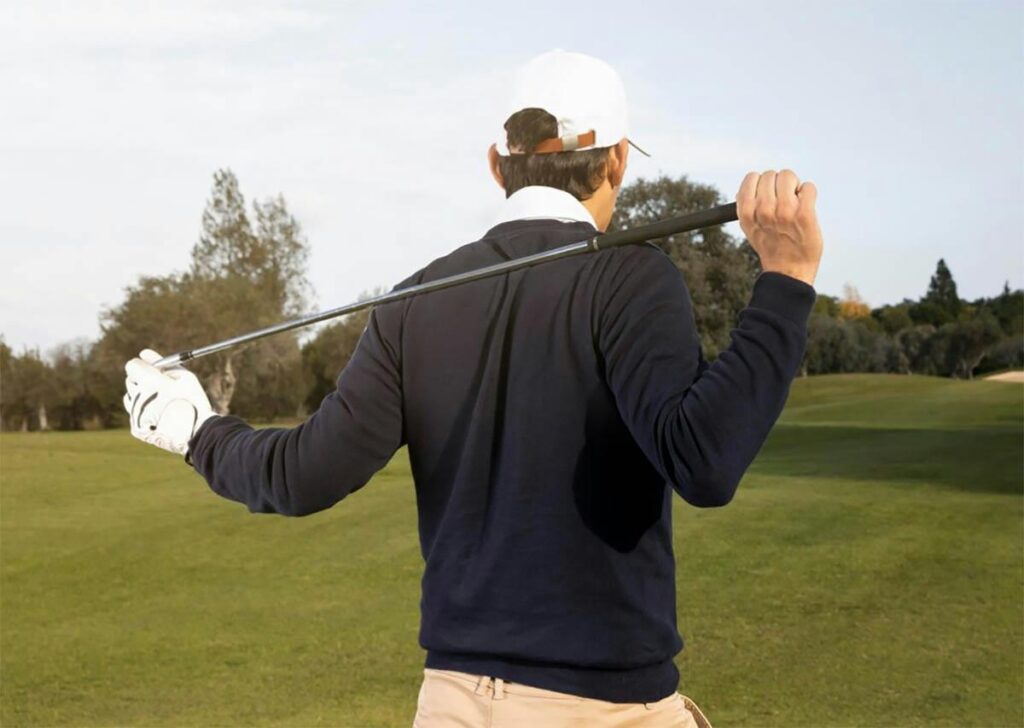Introduction
Golf is a sport that brings enjoyment and challenges, but for some enthusiasts, it also brings shoulder pain from golf swing, often exacerbated by the intricacies of the golf swing early extension. Understanding and addressing this shoulder pain is crucial for maintaining both the love for the game and physical well-being.
For professional guidance on shoulder health and rehabilitation, consider reaching out to Alliance Regen and Rehab. Your game and well-being deserve expert care.
Understanding Shoulder Pain From Golf Swing
The golf swing is a complex motion that engages various muscle groups, and the shoulders play a pivotal role in its execution. The repetitive nature and force involved in swinging leading to stress and strain on the shoulder joints and muscles. In amateur golfers, shoulder injuries range from 4-18.6%. These injuries affect golfers of all ages, with the likelihood increasing as they age.
Common Causes of Shoulder Pain in Golfers
Shoulder pain is quite common among golfers, making up around 8–18% of all golf-related injuries. Let’s delve into what causes injuries in golf:
Overuse Injuries: Amateur players who frequently engage in prolonged play may encounter opportunities for overuse injuries, including overuse syndrome, due to the repetitive nature of the swing.
Incorrect Swing Mechanics: Poor form and incorrect swing motions, especially during a powerful golf swing, can exert undue strain on the shoulders, particularly on the rotator cuff muscles, leading to discomfort and pain.
Poor Equipment Fitting: For expert advice on preventing and addressing golf-related injuries, including guidance on ill-fitted clubs, improper grip size, and even choosing the right golf shoes, consider consulting with an orthopedic specialist.
Symptoms of Shoulder Pain in Golfing

Reportedly, 47% of athletes considered “healthy” encounter shoulder pain during full performance, possibly explaining the observed findings. Recognizing the signs of shoulder pain is crucial for timely intervention:
Dull or Sharp Pain: Persistent pain, whether sharp or dull, should not be ignored, as it could indicate potential joint pain, shoulder impingement, frozen shoulder, rotator cuff tear, or a golf shoulder injury.
Limited Range of Motion: Difficulty in freely moving the shoulder, including limited shoulder rotation, could signal an underlying issue affecting the shoulder socket, shoulder blade, and overall shoulder motion.
Persistent Discomfort: Lingering discomfort, especially after a game, may signify a problem that needs attention, particularly if it involves repetitive motion during the golf swing, leading to a sore shoulder.
Impact of Shoulder Pain on Golf Performance
Shoulder pain can significantly affect a golfer’s performance, increasing the risk of injury and affecting the overall golf game.
Decreased Accuracy and Power: The inability to execute a full and unrestricted swing can reduce accuracy and power, potentially contributing to acute injury, loss of strength, and posterior instability.
Psychological Impact on the Golfer: Constant pain, often a common complaint among golfers, can impact the golfer’s mental focus and enjoyment of the game. Seeking beneficial therapy methods is crucial to alleviate discomfort and enhance overall well-being.
Treatment Approaches for Shoulder Pain
Addressing golf injuries and shoulder pain involves a multi-faceted approach, encompassing care for connective tissues and various aspects of shoulder health.
Rest and Activity Modification: Ensuring adequate rest for the shoulders is crucial to reduce the risk of injuries. A personal trainer can guide golf-related activities to prevent further aggravation.
Physical Therapy Exercises: Targeted exercises can effectively strengthen shoulder muscles and enhance flexibility, relieving golf-related shoulder pain and reducing the risk of shoulder instability.
Anti-Inflammatory Medications: Medications, including counter-pain medication and cortisone injections, can effectively alleviate acute pain and reduce inflammation associated with golfing injuries.
Pain Management Strategies: Techniques such as ice and heat application can provide relief, especially for pain with movement, contributing to alleviating discomfort and managing the onset of shoulder pain.
Surgical Interventions: In severe cases, arthroscopic surgery may be considered as a possible solution to address persistent and painful symptoms in senior golfers dealing with shoulder issues.
Prevention Strategies for Shoulder Pain

To maintain healthy shoulders and prevent common shoulder injuries, consider the following strategies.
Proper Warm-Up and Stretching Routines: Ensure a thorough warm-up before hitting the course.
Correct Swing Mechanics and Technique: Seek professional guidance to ensure a proper golf swing technique.
Strengthening Exercises for the Shoulder: Include exercises that target shoulder muscles in your fitness routine.
Core Stability and Balance Training: Enhance overall stability to reduce shoulder strain.
Equipment Considerations (Grip Size, Club Fitting): Ensure your golf equipment is tailored to your body and playing style.
Periodization and Rest Days: Plan rest days and alternate between intense and lighter practice sessions to avoid overuse injuries.
Rehabilitation and Return to Golf
When recovering from a shoulder issue, ease back into the game with light swings, gradually increasing intensity. Monitor your shoulder’s response regularly and adjust activities as needed for a smooth return to play.
For expert guidance on shoulder rehabilitation and personalized care, contact Alliance Regen and Rehab. Your journey to peak performance starts with the proper support.
Conclusion
In conclusion, understanding and addressing shoulder pain from a golf swing is vital for any avid golfer. By adopting preventive measures, seeking timely treatment, and ensuring a gradual return to the game, golf enthusiasts can continue to enjoy their favorite sport without compromising their shoulder health.
FAQs
Q1: Why does my left shoulder hurt when I swing golf clubs?
A1: Pain in the left shoulder during a golf swing, known as shoulder pain golf swing, may result from poor mechanics or overuse, impacting the enjoyment of the game. Seek professional guidance to pinpoint and address the issue. A golf instructor or physical therapist can analyze your swing, identify overuse, and recommend targeted interventions for effective relief and an improved golfing experience.
Q2: What exercises should you avoid with shoulder pain?
A2: To safeguard your shoulders from potential injuries, including shoulder pain after golf, it’s essential to steer clear of exercises that strain them, especially heavy overhead lifting. Consulting with a healthcare professional or physical therapist is highly recommended for personalized guidance. They can assess your specific condition, provide expert advice on suitable exercises, and create a comprehensive plan to ensure your shoulders’ well-being and optimal function.
Q3: How can shoulder pain be reduced?
A3: To alleviate golf shoulder pain, combine rest, targeted exercises, and proper technique. For personalized recommendations and expert guidance, consult with a healthcare professional. Their assessment will guide suitable exercises and strategies, ensuring effective relief and improved shoulder health.

